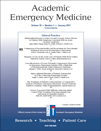One Last Question
It is the part of the ED visit I most dread: The patient’s one last question when I think I am finished and discharge is imminent. Because I work with residents, the patient’s work-up might be finished when I first speak to him or her. If the patient is being discharged, I will summarize what has happened and what we think is going on, describe what we have done (or are going to do), and advise him or her about return precautions and follow-up. This is my opportunity to detect any significant omissions in the resident’s work-up, and fortunately these oversights are rare. In most cases, the patient concurs with my “exit interview” assessment and is eager to leave. Frustratingly often, however, comes that one last question just as I reach for the curtain or doorknob to leave.
Admittedly, this is the patient’s last chance to get my attention; but if the issue was so important (indeed, it is often the real reason they came to the ED), why didn’t they ask sooner? “Doctor, can you write me a work excuse?”“What about my right arm numbness for the last two months [that I hadn’t mentioned to anybody yet]?” Perhaps the worst is, “I’m also having chest pain. What do you think is causing that?”
Usually, these last-minute questions about symptoms unrelated to the chief complaint are relevant only in the patient’s mind and can easily be dismissed. “Oh,” I say, “that’s something you really should ask your regular doctor when you see them next time,” assuming it sounded benign enough. I could not recall the last time one of these non sequitur questions just before discharge was actually relevant and interesting—until a couple of weeks ago.
Thomas was a 40-year-old with flank pain for 1 week. He was uninsured, had no past medical history, had passed a small stone in his urine, and had presented at his mother’s insistence. We treated his pain, but his history was so classic for urolithiasis that we debated whether he needed any radiologic work-up. Since he had no established history of kidney stones and would likely get no follow-up anywhere, we elected to order a CT urogram, urinalysis, and basic metabolic profile. When these all came back normal and discharge was imminent, I had my chance to talk to the patient.
He agreed with everything I said during the “exit interview” and was eager to leave now that his pain was controlled. I was finished with my evaluation and just turning to leave when he asked me the oddest question: “Hey doc, do kidney stones have anything to do with my hearing?”
“Ummm … Probably not.” I rapidly scanned a mental list of drugs associated with kidney stones or ototoxicity. Indinivir? Loop diuretics? No, this patient was taking no prescription medications. “What kind of hearing problem do you mean?”
He pressed a button on his electronic wristwatch and it emitted a few soft beeps. He held the watch up to his left ear and explained, “For the last couple of days, I couldn’t even hear that,” although he could hear it today. I thought he might have a cerumen impaction, or maybe an otitis, and asked another question to confirm this suspicion.
“Is it only the left ear?”
“No, both sides. And I’ve been having this ‘whooshing’ sound too,” he said while pointing to both ears, his forefingers tracing circles in the air that in other circumstances might be used to indicate somebody was crazy.
Then the connection dawned on me. I asked, “How much aspirin have you been taking?”
“Four pills every two hours. Is that too much?”




